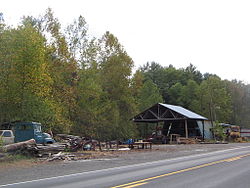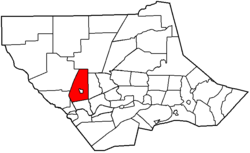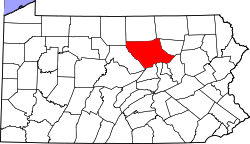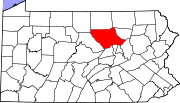- Mifflin Township, Lycoming County, Pennsylvania
-
For other Pennsylvania townships with similar names, see Mifflin Township, Pennsylvania.
Mifflin Township,
Lycoming County,
Pennsylvania— Township — A sawmill in Mifflin Township Map of Lycoming County, Pennsylvania highlighting Mifflin Township Map of Lycoming County, Pennsylvania Coordinates: 41°16′17″N 77°14′14″W / 41.27139°N 77.23722°WCoordinates: 41°16′17″N 77°14′14″W / 41.27139°N 77.23722°W Country United States State Pennsylvania County Lycoming Settled 1790 Incorporated 1803 Area – Total 27.9 sq mi (72.2 km2) – Land 27.9 sq mi (72.2 km2) – Water 0.0 sq mi (0.1 km2) Elevation[1] 1,181 ft (360 m) Population (2000) – Total 1,145 – Density 41.1/sq mi (15.9/km2) Time zone Eastern (EST) (UTC-5) – Summer (DST) EDT (UTC-4) FIPS code 42-49280[2] GNIS feature ID 1216760[1] Mifflin Township is a township in Lycoming County, Pennsylvania, in the United States. The population was 1,145 at the 2000 census. It is part of the Williamsport, Pennsylvania Metropolitan Statistical Area.
Contents
History
Mifflin Township was formed in 1803 by dividing Lycoming Township. It is named in honor of Thomas Mifflin the first governor of Pennsylvania.[3]
Early settlers
When colonial settlers first arrived in what is now Mifflin Township they were outside the western boundary of what was then the Province of Pennsylvania. These settlers were not under the jurisiction or protection of any type from any of the Thirteen Colonies. They became known as the Fair Play Men. These men established their own form of government, known as the "Fair Play System", with three elected commissioners who ruled on land claims and other issues for the group. In a remarkable coincidence, the Fair Play Men made their own Declaration of Independence from Britain on July 4, 1776 beneath the "Tiadaghton Elm" on the banks of Pine Creek.
Mifflin Township is located within the Larrys Creek watershed. This area was densely covered with trees and brush until about 1790 when the first settlers attempted to clear some of the land that surrounds Larrys Creek. John Murphy was the first settlers to establish a permanent homestead. He cleared some land along the creek and built a home. His daughter, Sarah, is thought to have been the first white child to have been born in Mifflin Township. Murphy was soon followed by other settlers who also built cabins, cleared some land for farming and built sawmills. Lumber was soon to become the dominant industry in Mifflin Township.
The Lumber Industry
As timber and lumber became a major industry in the mid-19th century, Larrys Creek, in Mifflin Township, was a source of power for sawmills and other mills. The first sawmill on the creek was built in 1799. The relatively low flow of water in the creek did not allow rafts of logs to be floated downstream to the river and the lumber boom at Williamsport.
This and the lack of logging railroads along the creek lead to the development of many small sawmills. Twelve sawmills were on the Second Fork, six on the First Fork, one each on Canoe Run and the rest were on Larrys Creek itself. By 1903 just two mills were still standing and only one of those was operating.
Lumbering removed the tree trunks, but left many flammable limbs, branches, and stumps behind. On May 2, 1872 a large forest fire destroyed the villages of Carter and Gould, 6 miles (10 km) north of Salladasburg on Larrys Creek in Mifflin Township. There are large tracts of second growth forest and small lumber companies still operate in the township today.
Geography
Mifflin Township is bordered by Cogan House Township to the north, Anthony Township to the east, Piatt Township to the south, Porter Township to the southwest, and Watson and Cummings Townships to the west. Mifflin Township surrounds the borough of Salladasburg.[4] As the crow flies, Lycoming County is about 130 miles (209 km) northwest of Philadelphia and 165 miles (266 km) east-northeast of Pittsburgh.
According to the United States Census Bureau, the township has a total area of 27.9 square miles (72.2 km²).27.9 square miles (72.2 km²) of it is land and 0.04 square miles (0.1 km²) of it (0.07%) is water.
Demographics
As of the census[2] of 2000, there were 1,145 people, 438 households, and 335 families residing in the township. The population density was 41.1 people per square mile (15.9/km²). There were 470 housing units at an average density of 16.9/sq mi (6.5/km²). The racial makeup of the township was 98.78% White, 0.17% African American, 0.26% Native American, 0.17% Asian, and 0.61% from two or more races.
There were 438 households out of which 34.7% had children under the age of 18 living with them, 63.9% were married couples living together, 8.4% had a female householder with no husband present, and 23.3% were non-families. 18.3% of all households were made up of individuals and 7.3% had someone living alone who was 65 years of age or older. The average household size was 2.61 and the average family size was 2.95.
In the township the population was spread out with 25.2% under the age of 18, 5.9% from 18 to 24, 30.7% from 25 to 44, 27.4% from 45 to 64, and 10.8% who were 65 years of age or older. The median age was 38 years. For every 100 females there were 100.9 males. For every 100 females age 18 and over, there were 98.8 males.
The median income for a household in the township was $36,205, and the median income for a family was $42,125. Males had a median income of $30,484 versus $21,319 for females. The per capita income for the township was $15,941. About 7.0% of families and 8.8% of the population were below the poverty line, including 7.8% of those under age 18 and 9.7% of those age 65 or over.
See also
For histories of the other townships in Lycoming County see
References
- ^ a b "US Board on Geographic Names". United States Geological Survey. 2007-10-25. http://geonames.usgs.gov. Retrieved 2008-01-31.
- ^ a b "American FactFinder". United States Census Bureau. http://factfinder.census.gov. Retrieved 2008-01-31.
- ^ Meginness, John Franklin (1892). History of Lycoming County, Pennsylvania: including its aboriginal history; the colonial and revolutionary periods; early settlement and subsequent growth; organization and civil administration; the legal and medical professions; internal improvement; past and present history of Williamsport; manufacturing and lumber interests; religious, educational, and social development; geology and agriculture; military record; sketches of boroughs, townships, and villages; portraits and biographies of pioneers and representative citizens, etc. etc. (1st ed.). Chicago, IL: Brown, Runk & Co.. ISBN 0-7884-0428-8. http://www.usgennet.org/usa/pa/county/lycoming/history/Chapter-34.html. Retrieved 2007-02-20. "(Note: ISBN refers to Heritage Books July 1996 reprint. URL is to a scan of the 1892 version with some OCR typos)."
- ^ Pennsylvania Department of Transportation, Bureau of Planning and Research, Geographic Information Division. "2007 General Highway Map Lycoming County Pennsylvania" (Map). 1:65,000. ftp://ftp.dot.state.pa.us/public/pdf/BPR_pdf_files/Maps/GHS/Roadnames/lycoming_GHSN.PDF. Retrieved 2009-12-26.
Municipalities and communities of Lycoming County, Pennsylvania City Boroughs Townships Anthony | Armstrong | Bastress | Brady | Brown | Cascade | Clinton | Cogan House | Cummings | Eldred | Fairfield | Franklin | Gamble | Hepburn | Jackson | Jordan | Lewis | Limestone | Loyalsock | Lycoming | McHenry | McIntyre | McNett | Mifflin | Mill Creek | Moreland | Muncy Creek | Muncy | Nippenose | Old Lycoming | Penn | Piatt | Pine | Plunketts Creek | Porter | Shrewsbury | Susquehanna | Upper Fairfield | Washington | Watson | Wolf | Woodward
CDPs Faxon | Garden View | Kenmar | Oval | Rauchtown‡
Unincorporated
communitiesGhost town Footnotes ‡This populated place also has portions in an adjacent county
Categories:- Townships in Lycoming County, Pennsylvania
- Populated places established in 1790
Wikimedia Foundation. 2010.




